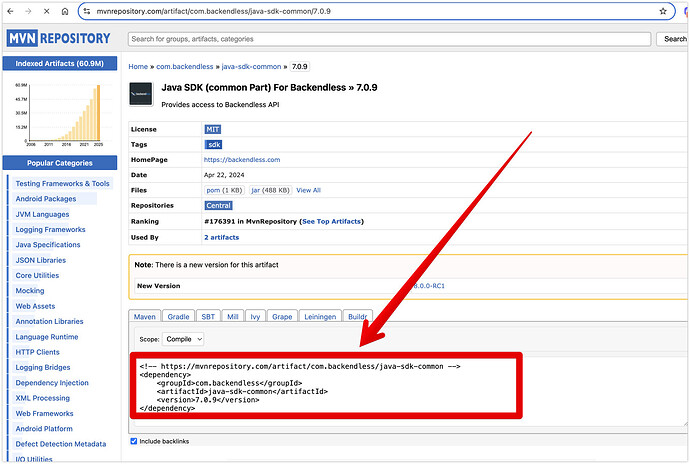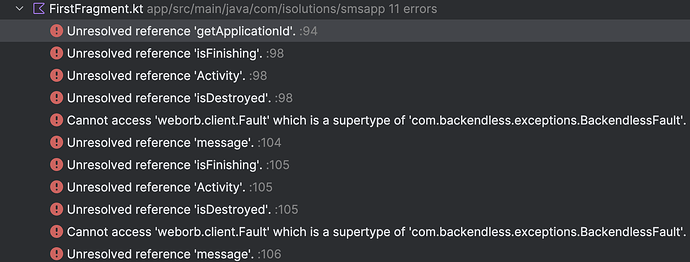Hi
During an ugrade I received this error message.
“FirebaseInstanceId is Deprecated: The FirebaseInstanceId class has been deprecated and replaced by FirebaseMessaging.getInstance().getToken(). It’s highly probable that a library you’re using (like Backendless) or your own code is still trying to use the old, now removed, FirebaseInstanceId.”
I found the same problem but not very clear how to solve it.
Thanks, Mario
Hi Mario,
What version of the Backendless SDK do you use?
Regards,
// Backendless
I’m working in a Demo SMS App to check just the problem and finally arrive to the same error following the Documentation of the website.
private fun proceedWithDeviceRegistration(context: Context) {
Log.d("FirstFragment", "Procediendo con el registro del dispositivo.")
val channels = ArrayList<String>()
channels.add("default") // O el canal que desees
// La siguiente línea asume que Backendless.initApp() ya se ejecutó
Backendless.Messaging.registerDevice(channels, object : AsyncCallback<DeviceRegistrationResult> { // Changed here
override fun handleResponse(response: DeviceRegistrationResult?) { // Changed here
Log.i("FirstFragment", "Dispositivo registrado con Backendless. Device ID: ${response.toString()}")
Toast.makeText(context, "Dispositivo registrado para notificaciones!", Toast.LENGTH_LONG).show()
}
override fun handleFault(fault: BackendlessFault?) {
Log.e("FirstFragment", "Error registrando dispositivo: ${fault?.message}")
Toast.makeText(context, "Error registrando dispositivo: ${fault?.message}", Toast.LENGTH_LONG).show()
}
})
}
// Backendless
Maybe must be different coding?
Typing 6.3.6 no error but 7.0.9 give me the error just try to compile.
Make sure the dependency is specified exactly as shown on the page I referenced:
OK copy & paste offer me this code
implementation(“com.backendless:java-sdk-common:7.0.9”)
and now …
I am sorry, I don’t quite understand where you copy/paste it to. Have you thought about taking your configuration file and posting it to chatgpt?
The versions 6.7.5 or 7.0.9 even 8.0.0-RC1 not working because not found.
Back to the only version working is 5.2.0 but to old for the Google Message.
Ask ChatGPT and also Grok without a solution.
Hi @Mario_Ghersi ,
As Mark pointed out you use an old Backendless SDK wich is deprecated now.Android SDK which has different signature and rely on newer dependencies.
Please replace line from your screen shoot by implementation("com.backendless:android-client-sdk:7.0.9") and try to rebuild your project.
Regards, Andriy
Dear Andriy
OK this help me to find the right version and now can you send me information of the new code because still give me errors.
Log.d("FirstFragment", "Procediendo con el registro del dispositivo.")
val channels = ArrayList<String>()
channels.add("default")
if (Backendless.getApplicationId() != null) {
Backendless.Messaging.registerDevice(channels, object : AsyncCallback<DeviceRegistrationResult> {
override fun handleResponse(response: DeviceRegistrationResult?) {
Log.i("FirstFragment", "Dispositivo registrado con Backendless. Device ID: ${response?.toString() ?: "null"}")
if (!isDetached && !context.isFinishing && context !is Activity && !context.isDestroyed) {
Toast.makeText(context, "Dispositivo registrado para notificaciones!", Toast.LENGTH_LONG).show()
}
}
override fun handleFault(fault: BackendlessFault?) {
Log.e("FirstFragment", "Error registrando dispositivo: ${fault?.message}")
if (!isDetached && !context.isFinishing && context !is Activity && !context.isDestroyed) {
Toast.makeText(context, "Error registrando dispositivo: ${fault?.message}", Toast.LENGTH_LONG).show()
}
}
})
} else {
Log.e("FirstFragment", "Backendless no inicializado. Llama a Backendless.initApp() primero.")
}
}
This code is not working, these are the errors:
Thanks, Mario
@Mario_Ghersi ,
Just checked your case.
implementation("com.backendless:java-sdk-common:7.0.9")
implementation("com.backendless:android-client-sdk:7.0.9")
In the new version of Backendless SDK there were some minor changes so you will need to adapt code in some places. For example, to access application ID with which your app was initialized you need to make next call Backendless.getApplicationIdOrDomain() instead of Backendless.getApplicationId().
Regards, Andriy
Hi Andriy
I’m following the documentation:
but is not the last version still give me errors and don’t know how to write the code.Grok.com but no info of the new implementation.
Thanks, Mario
Hi @Mario_Ghersi
We need more information from you about the current situation.
implementation("com.backendless:java-sdk-common:7.0.9")
implementation("com.backendless:android-client-sdk:7.0.9")
You may also need to add the following dependency in addition to those two:
implementation("com.backendless:java-client-sdk:7.0.9")
Please clarify what code you’re currently trying to run and what errors you’re getting.
Regards,
Dear Viktor
No, I can’t run the minimal android software, waste another day going in circles.
My Test minimal app is:
package com.isolutions.smsapp
object Default {https://api.backendless.com ”
And the json file is:
{
Maybe you can make a quick sample code to run this:
private void initNotification() {
// Verificar permisos antes de registrar
if (Build.VERSION.SDK_INT >= Build.VERSION_CODES.TIRAMISU) {
if (ContextCompat.checkSelfPermission(requireContext(), Manifest.permission.POST_NOTIFICATIONS) != PackageManager.PERMISSION_GRANTED) {
if (shouldShowRequestPermissionRationale(Manifest.permission.POST_NOTIFICATIONS)) {
Log.d("FirstFragment", "Mostrando justificación para permiso.");
} else {
Log.d("FirstFragment", "Solicitando permiso.");
}
requestPermissionLauncher.launch(Manifest.permission.POST_NOTIFICATIONS);
return;
}
}
Log.i("LoginResult", "Verificó Permisos");
if (Backendless.getApplicationIdOrDomain() != null) {
Log.i("LoginResult", "getApplicationIdOrDomain");
Backendless.Messaging.registerDevice(channels, new AsyncCallback<DeviceRegistrationResult>() {
@Override
public void handleResponse(DeviceRegistrationResult response) {
Log.i("LoginResult", "initNotification response: " + (response != null ? response.toString() : "null"));
if (response != null) {
// Aquí puedes llamar a readDeviceId() si lo necesitas
} else {
Log.w("LoginResult", "Response is null");
}
}
@Override
public void handleFault(BackendlessFault fault) {
Log.e("LoginResult", "initNotification response error: " + fault.toString());
Toast.makeText(requireContext(), "Error al registrar dispositivo: " + fault.getMessage(), Toast.LENGTH_SHORT).show();
}
});
} else {
Log.e("FirstFragment", "Backendless no inicializado. Llama a Backendless.initApp() primero.");
}
}
Thanks, Mario
Hello @Mario_Ghersi
Mario Ghersi:
Log.d("FirstFragment", "Procediendo con el registro del dispositivo.")
val channels = ArrayList<String>()
channels.add("default")
if (Backendless.getApplicationId() != null) {
Backendless.Messaging.registerDevice(channels, object : AsyncCallback<DeviceRegistrationResult> {
override fun handleResponse(response: DeviceRegistrationResult?) {
Log.i("FirstFragment", "Dispositivo registrado con Backendless. Device ID: ${response?.toString() ?: "null"}")
if (!isDetached && !context.isFinishing && context !is Activity && !context.isDestroyed) {
Toast.makeText(context, "Dispositivo registrado para notificaciones!", Toast.LENGTH_LONG).show()
}
}
override fun handleFault(fault: BackendlessFault?) {
Log.e("FirstFragment", "Error registrando dispositivo: ${fault?.message}")
if (!isDetached && !context.isFinishing && context !is Activity && !context.isDestroyed) {
Toast.makeText(context, "Error registrando dispositivo: ${fault?.message}", Toast.LENGTH_LONG).show()
}
}
})
} else {
Log.e("FirstFragment", "Backendless no inicializado. Llama a Backendless.initApp() primero.")
}
}
This code is not working, these are the errors:
Consider, for example, the message:
Unresolved reference 'isFinishing'. :98
we see context.isFinishing - but in your example you don’t see the context variable being retrieved/initialized. Is your context variable Context or Activity or something else? In such a situation it is impossible to say why you have this error.
Mario Ghersi:
private void initNotification() {
// Verificar permisos antes de registrar
if (Build.VERSION.SDK_INT >= Build.VERSION_CODES.TIRAMISU) {
if (ContextCompat.checkSelfPermission(requireContext(), Manifest.permission.POST_NOTIFICATIONS) != PackageManager.PERMISSION_GRANTED) {
if (shouldShowRequestPermissionRationale(Manifest.permission.POST_NOTIFICATIONS)) {
Log.d("FirstFragment", "Mostrando justificación para permiso.");
} else {
Log.d("FirstFragment", "Solicitando permiso.");
}
requestPermissionLauncher.launch(Manifest.permission.POST_NOTIFICATIONS);
return;
}
}
Log.i("LoginResult", "Verificó Permisos");
if (Backendless.getApplicationIdOrDomain() != null) {
Log.i("LoginResult", "getApplicationIdOrDomain");
Backendless.Messaging.registerDevice(channels, new AsyncCallback<DeviceRegistrationResult>() {
@Override
public void handleResponse(DeviceRegistrationResult response) {
Log.i("LoginResult", "initNotification response: " + (response != null ? response.toString() : "null"));
if (response != null) {
// Aquí puedes llamar a readDeviceId() si lo necesitas
} else {
Log.w("LoginResult", "Response is null");
}
}
@Override
public void handleFault(BackendlessFault fault) {
Log.e("LoginResult", "initNotification response error: " + fault.toString());
Toast.makeText(requireContext(), "Error al registrar dispositivo: " + fault.getMessage(), Toast.LENGTH_SHORT).show();
}
});
} else {
Log.e("FirstFragment", "Backendless no inicializado. Llama a Backendless.initApp() primero.");
}
}
I copied this code to my project, so far I see only two errors:
with the requireContext() method - it is not clear whether you are using this method inside the Fragment, most likely so, then there should be no problems, or are you using it from the androidx.core.content package?
with the requestPermissionLauncher variable - in your example it is not visible where this change is declared.
Regards,
Hi Volodymyr
The full function is:
private void initNotification() {
Log.i("LoginResult", "initNotification INIT");
List<String> channels = new ArrayList<>();
channels.add("default");
if (Build.VERSION.SDK_INT >= Build.VERSION_CODES.TIRAMISU) {
if (ContextCompat.checkSelfPermission(requireContext(), Manifest.permission.POST_NOTIFICATIONS) != PackageManager.PERMISSION_GRANTED) {
if (shouldShowRequestPermissionRationale(Manifest.permission.POST_NOTIFICATIONS)) {
Log.d("FirstFragment", "Mostrando justificación para permiso.");
} else {
Log.d("FirstFragment", "Solicitando permiso.");
}
requestPermissionLauncher.launch(Manifest.permission.POST_NOTIFICATIONS);
return;
}
}
Log.i("LoginResult", "Verificó Permisos");
if (Backendless.getApplicationIdOrDomain() != null) {
Log.i("LoginResult", "getApplicationIdOrDomain");
Backendless.Messaging.registerDevice(channels, new AsyncCallback<DeviceRegistrationResult>() {
@Override
public void handleResponse(DeviceRegistrationResult response) {
Log.i("LoginResult", "initNotification response: " + (response != null ? response.toString() : "null"));
if (response != null) {
// Aquí puedes llamar a readDeviceId() si lo necesitas
} else {
Log.w("LoginResult", "Response is null");
}
}
@Override
public void handleFault(BackendlessFault fault) {
Log.e("LoginResult", "initNotification response error: " + fault.toString());
Toast.makeText(requireContext(), "Error al registrar dispositivo: " + fault.getMessage(), Toast.LENGTH_SHORT).show();
}
});
} else {
Log.e("FirstFragment", "Backendless no inicializado. Llama a Backendless.initApp() primero.");
}
}
Please provide the right code to register the device to a default channel.
Hi
@Volodymyr_Ialovyi or @Viktor_Mudrevsky or @Andriy_Konoz please I’m still waiting the code to register a “default” channel to handle notifications, for the new version 7.0.9
Thanks, Mario
Hi @Mario_Ghersi
I’ve uploaded a file named Mario.zip to your SMSApp application. You can find it in the root directory of File Service .
The archive contains a minimal project that registers a device. I tested it in my Android Studio, and it worked — the device was registered successfully, and a corresponding record appeared in the DeviceRegistration table.
I hope this minimal project helps you.
Regards,
Hi Viktor
18 days later finally your code is working, a lot of upgrades and tests. I will write here for my self some of the setups to check.
plugins {
and
plugins {
android {
defaultConfig {
applicationId "com.isolutions.smsapp"
minSdk 28
targetSdk 36
versionCode 1
versionName "1.0"
testInstrumentationRunner "androidx.test.runner.AndroidJUnitRunner"
}
buildTypes {
release {
minifyEnabled false
proguardFiles getDefaultProguardFile('proguard-android-optimize.txt'), 'proguard-rules.pro'
}
}
compileOptions {
sourceCompatibility JavaVersion.VERSION_21
targetCompatibility JavaVersion.VERSION_21
}
}
dependencies {
implementation platform('com.google.firebase:firebase-bom:34.1.0')
implementation 'com.google.firebase:firebase-analytics'
implementation 'com.google.firebase:firebase-core:21.1.1'
implementation 'com.google.firebase:firebase-messaging:25.0.0'
implementation group: 'com.backendless', name: 'android-client-sdk', version: '7.0.9'
implementation group: 'io.socket', name: 'socket.io-client', version: '2.1.2'
}
The Java Version was one of the problems to upgrade correctly to 21.
Now it’s time to implement in my code.





